Events and Activities
Workshop on discursive and material dimensions of the digital transformation
 Based on perspectives from and on Japan, this workshop brings together 20 scholars to discuss connecting approaches and analytical concepts in digital transformation. Discursive and material dimensions of the digital transformation: Perspectives from and on Japan will explore visions, practices, and narratives in politics, research and development, and science fiction related to robots, artificial intelligence, and algorithms (day 1); the use of data and the development of data infrastructures with regard to their socio-cultural, economic, and historical situation (day 2). On the final day, the results of the previous days are compiled and related from a transdisciplinary perspective to think about possibilities of employing them productively. The workshop will draw on approaches from media and cultural studies, anthropology, the history of science, and science and technology studies. It takes place 11-13 September online, at Sophia University (keynotes), and in Shimokitazawa. Details and registration here
Based on perspectives from and on Japan, this workshop brings together 20 scholars to discuss connecting approaches and analytical concepts in digital transformation. Discursive and material dimensions of the digital transformation: Perspectives from and on Japan will explore visions, practices, and narratives in politics, research and development, and science fiction related to robots, artificial intelligence, and algorithms (day 1); the use of data and the development of data infrastructures with regard to their socio-cultural, economic, and historical situation (day 2). On the final day, the results of the previous days are compiled and related from a transdisciplinary perspective to think about possibilities of employing them productively. The workshop will draw on approaches from media and cultural studies, anthropology, the history of science, and science and technology studies. It takes place 11-13 September online, at Sophia University (keynotes), and in Shimokitazawa. Details and registration here
DIJ researchers and alumni at EAJS conference
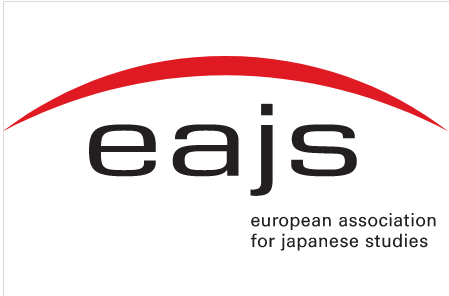 Six DIJ researchers and more than twenty DIJ alumni will present their latest research at this year’s tri-annual conference of the European Association for Japanese Studies (EAJS). Paper presenters include Franz Waldenberger and Markus Heckel (Economics, Business and Political Economies section), Nora Kottmann (Anthropology and Sociologies section), Torsten Weber (History section), Sebastian Polak-Rottmann (Urban, Regional and Environmental Studies section), and Sarah Pützer (Modern Literatures section). The conference takes place at Ghent University from August 17-20, 2023. Programme and details here.
Six DIJ researchers and more than twenty DIJ alumni will present their latest research at this year’s tri-annual conference of the European Association for Japanese Studies (EAJS). Paper presenters include Franz Waldenberger and Markus Heckel (Economics, Business and Political Economies section), Nora Kottmann (Anthropology and Sociologies section), Torsten Weber (History section), Sebastian Polak-Rottmann (Urban, Regional and Environmental Studies section), and Sarah Pützer (Modern Literatures section). The conference takes place at Ghent University from August 17-20, 2023. Programme and details here.
Online lecture by David Malitz on ‘Siam in the Japanocentric World Order’
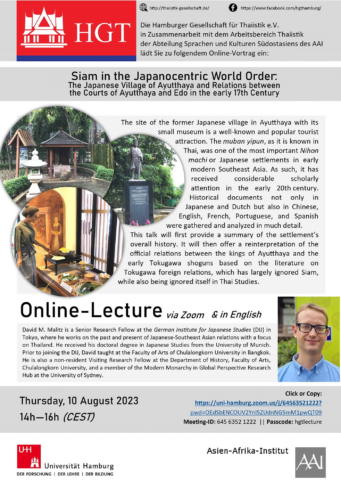
Upon invitation by the Hamburger Gesellschaft für Thaiistik (Hamburg Society for Thai Studies), DIJ senior research fellow David M. Malitz will give an online presentation on 10 August to discuss Siam in the Japanocentric World Order. His presentation will focus on the former Japanese village of Ayutthaya, now a well-known and popular tourist attraction, and the relations between the Courts of Ayutthaya and Edo in the early 17th century. The muban yipun, as it is known in Thai, was one of the most important Japanese settlements in early modern Southeast Asia. As such, it has received considerable scholarly attention in the early 20th century. David’s talk will first provide a summary of the settlement’s overall history. It will then offer a reinterpretation of the official relations between the kings of Ayutthaya and the early Tokugawa shoguns based on the literature on Tokugawa foreign relations. Details and Zoom link here
DIJ Forum on Japan’s Strategic Partnerships in South East Asia
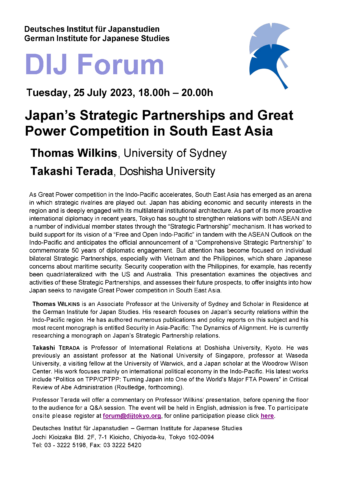 As Great Power competition in the Indo-Pacific accelerates, South East Asia has emerged as an arena in which strategic rivalries are played out. As part of its more proactive international diplomacy in recent years, Tokyo has sought to strengthen relations with both ASEAN and a number of individual member states through the “Strategic Partnership” mechanism. It has also worked to build support for its vision of a “Free and Open Indo-Pacific” in tandem with the ASEAN Outlook on the Indo-Pacific and anticipates the official announcement of a “Comprehensive Strategic Partnership” to commemorate 50 years of diplomatic engagement. This hybrid DIJ Forum on 25 July examines the objectives and activities of these Strategic Partnerships, and assesses their future prospects, to offer insights into how Japan seeks to navigate Great Power competition in South East Asia. Details and registration here
As Great Power competition in the Indo-Pacific accelerates, South East Asia has emerged as an arena in which strategic rivalries are played out. As part of its more proactive international diplomacy in recent years, Tokyo has sought to strengthen relations with both ASEAN and a number of individual member states through the “Strategic Partnership” mechanism. It has also worked to build support for its vision of a “Free and Open Indo-Pacific” in tandem with the ASEAN Outlook on the Indo-Pacific and anticipates the official announcement of a “Comprehensive Strategic Partnership” to commemorate 50 years of diplomatic engagement. This hybrid DIJ Forum on 25 July examines the objectives and activities of these Strategic Partnerships, and assesses their future prospects, to offer insights into how Japan seeks to navigate Great Power competition in South East Asia. Details and registration here
Thomas Wilkins, University of Sydney/DIJ Tokyo
Takashi Terada, Doshisha University
DIJ co-organizes ‘Japan-China Relations, 2001-2022’ book talk
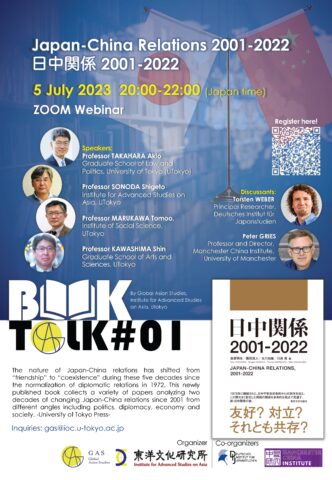
The nature of Japan-China relations has shifted from “friendship” to “coexistence” during the five decades since the normalization of diplomatic relations in 1972. The newly published book Japan-China Relations, 2001-2022 (日中関係 2001-2022, University of Tokyo Press, 2023) collects seventeen chapters analyzing two decades of Japan-China relations since 2001 from different angles including politics, diplomacy, economy, and society. The online book talk “Japan-China Relations 2001-2022” on 5 July 2023 features the editors Takahara Akio (Graduate School of Law and Politics, University of Tokyo), Sonoda Shigeto (Institute for Advanced Studies on Asia, University of Tokyo), Marukawa Tomoo (Institute of Social Science, University of Tokyo), and Kawashima Shin (Graduate School of Arts and Sciences, University of Tokyo). Peter Gries (Manchester China Institute, University of Manchester) and DIJ principal researcher Torsten Weber will serve as discussants. The event is organized by the Global Asian Studies Initiative at the Institute for Advanced Studies on Asia and co-organized by the DIJ and the Manchester China Institute. Registration here
DIJ Study Group session on ‘The Sublime and Wabi-Sabi’

One of the most noteworthy examples of the Japanese art form known as karesansui (枯山水), i. e. dry landscape garden, can be found at the Ryōan-ji in Kyoto. Philippe Bürgin proposes that the aesthetic appeal of this garden’s composition can be fruitfully recontextualized in accordance with the aesthetic category of the Kantian sublime, in the sense that its abstract moments point towards a void, an idea, something that goes beyond our perception – but still within our perception. The aesthetic moments of the sublime coincide with Japanese aesthetic categories such as wabi-sabi by marking the spatial and temporal thresholds of what is representable. The presentation argues that there is a latent sublimity to Japanese art works in which even modern forms of artistic expression might have been anticipated. Details and registration here
Philippe Bürgin, State University of Fine Arts Stuttgart/DIJ Tokyo
Hybrid DIJ Study Group on Patronage and “Confucian Diplomacy”
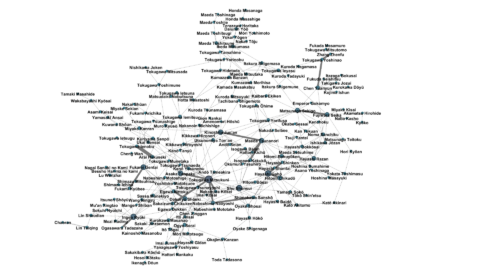
The 17th century holds historical significance as the formative period of Japan’s early modern scholarship. Heavily influenced by Confucian learning traditions, this era’s academic structures and intellectual patterns paved the way for Japan’s modernisation in the 19th century. This presentation aims to shed light on two new perspectives regarding the reign of Maeda Tsunanori (1643-1724), the fourth ruler of Kaga domain. Firstly, it will examine the standing of primarily Confucian scholars within the Kaga domain, their affiliation with Tsunanori, and his initiatives to support them. Secondly, the role of knowledge and scholarship in Tsunanori’s position within the political system will be investigated, along with the extent to which his education and his academic endeavours shaped his interactions with other rulers and prominent figures. This presentation also seeks to explore whether Tsunanori engaged in what might be termed “Confucian diplomacy”. Details and registration here
Michael Dietrich, Martin-Luther-University Halle-Wittenberg/DIJ Tokyo
Online DIJ Study Group on Growth-oriented Carbon Pricing Concept

The Growth-oriented Carbon Pricing Concept in Japan refers to a set of policies aimed at reducing greenhouse gas emissions through a market-based approach that incentivizes the use of low-carbon technologies and practices. It is the most important part of the Basic Policy for Green Transformation (GX) Realization, as outlined by the Kishida administration, and consists of GX Economic Transition Bonds, emission trading system and carbon charge system. Its goal is to reduce emissions and to promote sustainable economic growth and job creation, by encouraging innovation and investment in low-carbon industries. The concept is part of Japan’s broader strategy to address climate change and achieve its goal of becoming carbon neutral by 2050. This session of the DIJ Study Group on ‘The Political Economy of Carbon Pricing and Green Finance – Comparing the EU and Japanese Discourses and Policy Approaches’ takes place online. Details and registration here
Tokutaro Nakai, former Vice Minister, Ministry of the Environment, Japan, Executive Advisor to Nippon Steel Corporation
with comments by Nobuyuki Kinoshita, Tokyo Financial Exchange





 Open Access
Open Access
